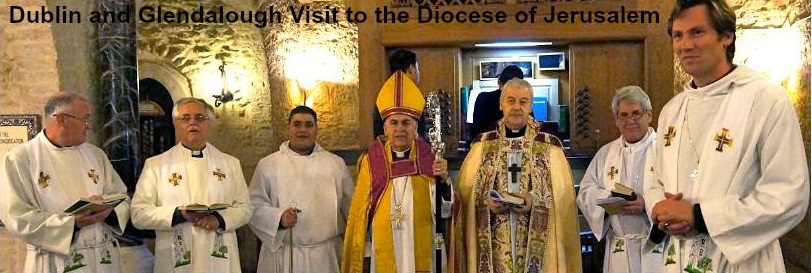
By editor - 11 January, 2016

Courtesy: The United Dioceses of Dublin & Glendalough
The Church of Ireland Archbishop of Dublin and Glendalough has signed a significant accord with the Diocese of Jerusalem’s Archbishop Suheil Dawani which is aimed at bringing the two dioceses into closer partnership.
Archbishop Michael Jackson is currently in the Middle East with a delegation from Dublin and Glendalough which includes the Rev Ken Rue, Jan de Bruijn and Linda Chambers of Us.
The Diocese of Jerusalem spans Jordan, Palestine, Israel, Syria and Lebanon.
During the course of the visit, the Irish delegation has been meeting clergy and people of the Diocese of Jerusalem and visiting churches, hospitals and schools.
They visited Al Ahli Hospital in Gaza which the Diocese of Dublin and Glendalough raised over €110,000 for in Advent 2014.
A particular aim of the visit is to learn more about the impact of the Syrian crisis throughout the region and to discuss how schools and churches in Ireland can link up with their counterparts in the region.
There are also hopes that the new accord could foster pilgrimages to each others’ dioceses.
Archbishop Jackson has also been outlining the workings and successes of the Come&C project with a view to working with the Church in Jerusalem towards doing a similar exercise around the Five Marks of Mission of the Anglican Communion.
Last Wednesday (6 January) Archbishop Jackson preached in St George’s Cathedral in Jerusalem for the Feast of the Epiphany. He spoke of the importance of geography, place, history and presence.
“Those of us who come from afar to mark and celebrate the Epiphany with you in the Land of the Holy One are very conscious of our rootedness in, our dependence on you and on your faith in often impossibly hard times and circumstances in this place and in this lived and living history. Your witness inspires and embodies the witness of millions of Christian people worldwide; and for it we are profoundly grateful,” he said.
“You rightly describe yourselves as Living Stones: Living Stones, as the hymn writer expresses it, by God appointed: appointed to watch and pray and live and respond. Each one of you is part of the building, the edifice, of witness and salvation. Both witness and salvation are chiselled out in the story of faith that all of you share with all of us: a story of God becoming human in order that we might, through his self–emptying and self–giving in love and service here in the Galilee and in Jerusalem, share in his divinity,” he commented.
The Archbishop also spoke of those who had been forced to flee the region and the Anglican diocese in the Middle East, particularly Syria and said that Europe was not coping very well.
“Western society has become very individualised, very compartmentalised and very fond of its own space. It has also lost touch with the sense that God infuses our public spaces for the common good. Many people simply do not want neighbours; they want privacy. This makes it terribly difficult to do anything that makes a difference in love for the people who are in greatest need. It has also made us unsure of ourselves as we relate suddenly to a ‘them’ who are now an ‘us’,” Dr Jackson stated.
In 2016 the people of Ireland would need to develop a compassionate approach and a sustained response to those who come in fear and trauma, he suggested.
Those people who come here would also long for human acceptance and recognition of their identity that takes on board who they are and who they will become in Ireland.
“This is a grace we need to accept and to re–discover. Our hope is that, as an island people, we might do this with good grace and that, as a nation of people who have emigrated time and again, we might somehow understand and be sensitive to the fears in arriving somewhere new together with the bereavement of leaving all we ever knew behind,” he said.